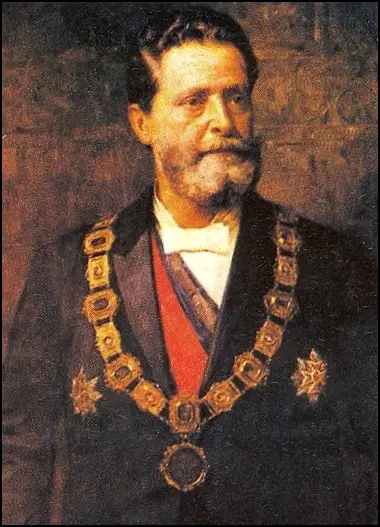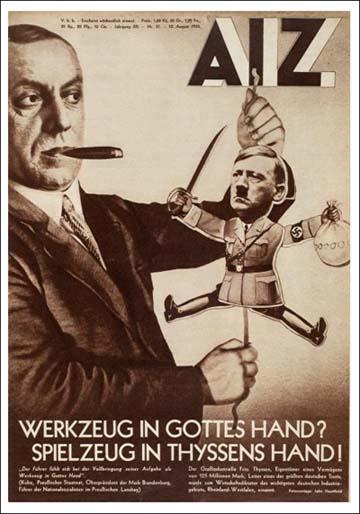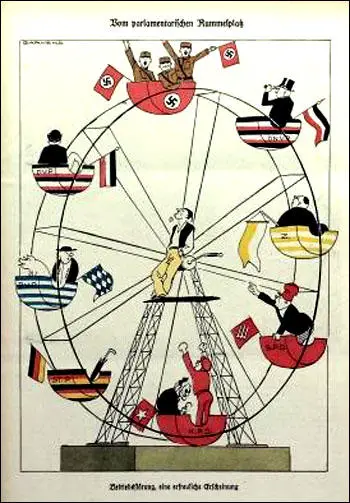Adolf Hitler and Anti-Semitism
OnIn 1908 Adolf Hitler was an extremely unhappy man. His much-loved mother, Klara Hitler, had died of cancer on 21st December, 1907. He moved to Vienna with the objective of becoming a student of the Academy of Art, but twice his application was rejected. His friend August Kubizek claims that Hitler took the news of the second rejection very badly: "Choking with his catalogue of hates, he would pour his fury over everything, against mankind in general who did not understand him, who did not appreciate him and by whom he was persecuted and cheated... I had the impression that Adolf Hitler became unbalanced." Without saying goodbye Hitler left the flat he was sharing with Kubizek and became homeless. (1)
It was during this period Hitler heard the Karl Lueger, the leader of the Christian Social Party (CSP) and the mayor of the city, making a speech. Males in Austria had been given the vote in 1896. The Social Democratic Workers' Party (SDAP) soon became the largest political party. Its leader was Victor Adler, and Lueger attacked him for his Jewish origins and his Marxism. Lueger advocated an early form of "fascism". This included a radical German nationalism (meaning the primacy and superiority of all things German), social reform, anti-socialism and anti-semitism. In one speech Lueger commented that the "Jewish problem" would be solved, and a service to the world achieved, if all Jews were placed on a large ship to be sunk on the high seas. (2)

These speeches by Lueger upset Franz Joseph, the Emperor of the Austria–Hungary Empire, who in 1867 had granted the Jewish population equal rights, saying "the civil rights and the country's policy is not contingent in the people's religion". The persecution of Jews under Tsar Alexander III resulted in large-scale emigration from Russia and by 1890 over 100,000 Jews lived in Vienna. This amounted to 12.1% of the total population of the city. Migration from Russia grew even faster after the forced expulsion of Jews from Moscow in 1891. (3)
Emperor Franz Joseph had become closely associated with S M von Rothschild, a banking enterprise established in 1820 in Vienna, by Salomon Mayer Rothschild. The business prospered, financing various Austrian government undertakings where large amounts of capital had to be raised. The bank played a major role in the building of the country's economic infrastructure including the first rail transport networks. The bank was later run by Anselm von Rothschild and Albert Salomon von Rothschild. The historian, Hannah Arendt, has argued that the close connection between the Rothschilds and the financial interests of the monarchy caused a great deal of resentment against Jewish capitalists. (4)
Karl Lueger and Adolf Hitler
After the 1895 elections for the Vienna's City Council the Christian Social Party, with the support of the Catholic Church, won two thirds of the seats. Lueger was selected to became mayor of Vienna but this was overruled by Emperor Franz Joseph who disliked his anti-semitism. The Christian Social Party retained a large majority in the council, and re-elected Lueger as mayor three more times, only to have Franz Joseph refuse to confirm him each time. He was elected mayor for a fifth time in 1897, and after the personal intercession by Pope Leo XIII, his election was finally sanctioned later that year. Konrad Heiden has pointed out that without the "all-powerful Catholic Church" Lueger could never have achieved power." (5)
In the worst pogrom year, from mid 1905 to mid-1906, more than 200,000 Jews emigrated from Russia. It is estimated that by the time that Adolf Hitler arrived in Vienna there were over 175,000 Jews in the city. Hitler claims that at first he was unaware of the problem of Jewish immigration. "At home I do not remember having heard the word during my father's life-time". At high school there was a Jewish boy - "but we didn't give the matter any thought... I even took them (the Jews) for Germans". (6)
Initially Hitler did not identify the Jews as a cause of his poverty. "Oppressed by the hardship of my own lot, I gained at first no insight into the inner stratification of the people in this gigantic city. Notwithstanding that Vienna in those days counted nearly two hundred thousand Jews among its two million inhabitants, I did not see them... The Jew was still characterized for me by nothing but his religion, and therefore on grounds of human tolerance I maintained my rejection of religious attacks in this case as in others. Consequently the tone of the Viennese anti-Semitic press seemed to me unworthy of the cultural traditions of a great nation." (7)
Hitler pointed out in Mein Kampf (1925) that it was Lueger who helped develop his anti-Semitic views: "When I arrived in Vienna, I was hostile to Dr. Karl Lueger and the Christian Social Party... The man and the movement seemed reactionary in my eyes. My common sense of justice, however, forced me to change this judgment in proportion as I had occasion to become acquainted with the man and his work; and slowly my fair judgment turned to unconcealed admiration... For a few hellers I bought the first anti-Semitic pamphlets of my life.... Wherever I went, I began to see Jews, and the more I saw, the more sharply they became distinguished in my eyes from the rest of humanity. Particularly the Inner City and the districts north of the Danube Canal swarmed with a people which even outwardly had lost all resemblance to Germans. And whatever doubts I may still have nourished were finally dispelled by the attitude of a portion of the Jews themselves." (8)
Hitler began to blame the Jews for all the problems he observed in Vienna. "Was there any form of filth or profligacy, particularly in cultural life, without at least one Jew involved in it? If you cut even cautiously into such an abscess, you found, like a maggot in a rotting body, often dazzled by the sudden light - a kike!" According to Hitler, the Jews were largely responsible for prostitution in the city. "When for the first time I recognized the Jew as the cold-hearted, shameless and calculating director of this revolting vice traffic in the scum of the big city, a cold shudder ran down my back." (9)
The main thing that Hitler learned from Lueger was how the use of violent language could influence the way people thought about political issues. Lueger persuaded the people to direct their anger towards the Jews, many of them recently arrived immigrants to Vienna. Hitler was able to blame the Jews for all the problems he faced. At the same time he developed a hatred for those who were leading the opposition to Lueger, the Social Democratic Workers' Party. He especially disagreed with its internationalism and desire for equality. "What most repelled me, was its hostile attitude toward the struggle for the preservation of Germanism... In a few months I obtained what might have otherwise required decades: an understanding of a pestilential whore, cloaking herself as a social virtue and brotherly love." (10)
Hitler later became critical of Lueger because he never really carried out any real action against the Jews. The Jewish journalist and novelist, Stefan Zweig, who was living in Vienna at the time, pointed out in his autobiography, The World of Yesterday (1942), that Lueger never allowed his official anti-Semitism to stop him from being helpful and friendly to the Jews: "His city administration was perfectly just and even typically democratic... The Jews who had trembled at the triumph of the anti-Semitic party continued to live with the same rights and esteem as always." (11)
Oratory in Politics
It was not only the anti-semitic rhetoric that Hitler learnt from Lueger. It was the importance of oratory in politics. "The power which has always started the greatest religious and political avalanches in history rolling has from time immemorial been the magic power of the spoken word, and that alone. The broad masses of the people can be moved only by the power of speech. All great movements are popular movements, volcanic eruptions of human passions and emotional sentiments, stirred either by the cruel Goddess of Distress or by the firebrand of the world hurled among the masses." (12)
Hitler's comments were based on his own experiences. However, in recent years we have discovered why people are moved by "volcanic eruptions of human passions and emotional sentiments". As Nancy Moyer points out: "The frontal lobes are the two large areas at the front of your brain. They’re part of the cerebral cortex, which is a newer, rational, and more advanced brain system. This is where thinking, reasoning, decision-making, and planning happen. The frontal lobes allow you to process and think about your emotions. You can then manage these emotions and determine a logical response."
Moyer adds that the "amygdala is a collection of cells near the base of the brain". This is where emotions are given meaning, remembered, and attached to associations and responses to them. "Early humans were exposed to the constant threat of being killed or injured by wild animals or other tribes. To improve the chances of survival, the fight- or-flight response evolved. It’s an automatic response to physical danger that allows you to react quickly without thinking. When you feel threatened and afraid, the amygdala automatically activates the fight-or-flight response by sending out signals to release stress hormones that prepare your body to fight or run away." (13)
Trevor Rollings makes the same point in his book, We Are More than Our Brains (2017): "Our political discourse is particularly vulnerable to limbic manipulation. Liberalism is founded on the ability of reasoned debate to resolve our differences, but liberal politicians have been accused of underestimating the role of feeling in how we choose our leaders. Populist rabble-rousers know only too well the benefits of playing on people's fears, hatreds, grievances and prejudices. The limbus is a sucker for conspiracy theories, repeated half-truths, fake news and false promises. Populism is a version of politics that sets the id against the superego, or the people against perceived threats or oppressors. The problem is that if we set suspicion, private need, gut-feeling and immediate interest over trust, critical debate, mutuality and longer term policy, we squander the capacity to legislate for the good of the next generation, saving forests and coral reefs, opting for energy technologies which involve short term pain for longer term gain." (14)
Hitler used language to bypass the frontal lobes (what is known as the "amygdala hijack") and as leader of the Nazi Party, used the same strategy as Karl Lueger. However, it had but with little impact in the 1920s. Despite losing the First World War and the signing of the Versailles Peace Treaty, the "ensuing Weimar Republic was perhaps the world’s most democratic state yet - with free elections, voting rights for all adults (male and female), an independent judiciary, a free press, regional autonomy and elections by proportional representation. In the 1920 elections the parties that had brought the Republic into being won an overwhelming majority. It seemed as though nothing could go wrong." (15)
Hitler began to make progress when he met up with Joseph Goebbels. Both men were impressed with each other. Goebbels described one of their first meetings in his diary: "Hitler begins to speak. What a voice. What a gestures, what passion. Exactly what I had wanted from him. I can scarcely contain myself. My heart stands still. I hang on every word.... Shakes my hand. Like an old friend. And those big blue eyes. Like stars. He is glad to see me. I am in heaven. That man has everything to be king.... I am ready to sacrifice everything for this man. History gives peoples the greatest men in the greatest times of need." (16)
Hitler and Goebbels shared an interest in propaganda and together they planned how the Nazi Party would win the support of the German people. Hitler's first biographer, Konrad Heiden, attempted to explain how he did this: "The true aim of political propaganda is not to influence, but to study, the masses. The speaker is in constant communication with the masses; he hears an echo, and senses the inner vibration. In forever setting new and contradictory assertions before his audience, Hitler is tapping the outwardly shapeless substance of public opinion with instruments of varying metals and varying weights. When a resonance issues from the depths of the substance, the masses have given him the pitch; he knows in what terms he must finally address them. Rather than a means of directing the mass mind, propaganda is a technique for riding with the masses." (17)
As Hannah Arendt, a philosopher who grew up in Nazi Germany, pointed out in her book, The Origins of Totalitarianism (1951) that figures like Karl Lueger and Adolf Hitler, need to find a way of communicating with the mob. "The mob is primarily a group in which the residue of all classes are represented. This makes it so easy to mistake the mob for the people, which also comprises all strata of society. While the people in all great revolutions fight for true representation, the mob always will shout for the 'strong man,' the 'great leader.' For the mob hates society from which it is excluded." (18)
Anti-Semitism and the Nazi Party
In 1927 Hitler was introduced to Emil Kirdorf, a very wealthy industrialist. Although Kirdorf agreed with most of Hitler's views he was concerned about some of the policies of the Nazi Party. He was particularly worried about the opinions of some people in the party such as Gregor Strasser who talked about the need to redistribute wealth in Germany. Hitler tried to reassure Kirdorf that these policies were just an attempt to gain the support of the working-class in Germany and would not be implemented once he gained power. Kirdorf suggested that Hitler should write a pamphlet for private distribution amongst Germany's leading industrialists that clearly expressed his views on economic policy. (19)
Kirdorf and his wealthy right-wing friends were particularly attracted to Hitler's idea of winning the working class away from left-wing political groups such as the Social Democratic Party (SPD) and the Communist Party (KPD). Kirdorf and other business leaders were also impressed with the news that Hitler planned to suppress the trade union movement once he gained power. Kirdorf joined the Nazi Party and immediately began to try and persuade other leading industrialists to supply Hitler with the necessary funds to win control of the Reichstag. Kirdorf gave the party "100,000 Marks that went a long way towards overcoming the party's immediate financial plight." (20)

(Copyright The Official John Heartfield Exhibition & Archive)
Otto Dietrich, the Press Chief of the Nazi Party, later recalled: "Our Führer suddenly decided to concentrate systematically on cultivating the influential economics magnates... In the following months he traversed Germany from end to end, holding private interviews with prominent personalities. Any rendezvous was chosen, either in Berlin or in the provinces, in the Hotel Kaiserhof or in some lonely forest-glade. Privacy was absolutely imperative, the Press must have no chance of doing mischief." (21)
Adolf Hitler constantly argued that German prosperity would not last and warned that the country was about to suffer an economic recession. The fortunes of the Nazi Party changed with the Wall Street Crash in October 1929. Desperate for capital, the United States began to recall loans from Europe. One of the consequences of this was a rapid increase in unemployment. Germany, whose economy relied heavily on investment from the United States, suffered more than any other country in Europe. (22)
With the drop in demand for labour, wages also fell and those with full-time work had to survive on lower incomes. Hitler, who was considered a fool in 1928 when he predicted economic disaster, was now seen in a different light. Hitler told a Munich audience: "We are the result of the distress for which the others were responsible." People began to say that if he was clever enough to predict the depression maybe he also knew how to solve it. (23)

However, it was never Hitler's intention to use logic in his arguments. Instead he blamed the Jews for the problems that faced Germany. In the General Election that took place in September 1930, the Nazi Party increased its number of representatives in parliament from 14 to 107. Hitler was now the leader of the second largest party in Germany. Harold Harmsworth, 1st Lord Rothermere, the owner of The Daily Mail and a long-term supporter of the Nazi Party, wrote in his newspaper after the general election result: "What are the sources of strength of a party which at the general election two years ago could win only 12 seats, but now, with 107, has become the second strongest in the Reichstag, and whose national poll has increased in the same time from 809,000 to 6,400,000? Striking as these figures are, they stand for something far greater than political success. They represent the rebirth of Germany as a nation." (24)
